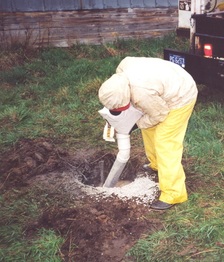Groundwater Protection - Agriculture

Agricultural producers can take steps to protect groundwater by utilizing the following resources:
Michigan Agriculture Environmental Assurance Program (MAEAP)
MAEAP is a voluntary, proactive program to reduce producers' legal and environmental risks and teaches effective land stewardship practices that comply with state and federal regulations and identify and prevent agricultural pollution risks on their farms.
Review the "MAEAP page" for more information about MAEAP.
Clean Sweep Program - Pesticide and Container Recycling
Unused pesticides can be disposed of and empty pesticide containers can be recycled at:
Washtenaw County Service Center
705 N. Zeeb Road
Ann Arbor MI 48103
Call to make a drop-off appointment: (734) 222-6874.
For more information visit the Washtenaw County Clean Sweep web site.
Spill Response Program
This program helps reduce environmental impacts associated with pesticide, fertilizer and manure spills. If a spill occurs, agri-chemical users should call the Michigan Department of Agriculture & Rural Development 24-hour hotline (1-800-405-0101).
This gives access to information, technical assistance, and in some cases financial assistance for dealing with the control, containment and cleanup of a spill.
Well Closures
Why close abandoned wells?
Only the landowner or a licensed well driller can legally close an abandoned well. The process for dug wells and hand driven wells is not difficult. However drilled, deep, bedrock and artesian (flowing) wells should be closed by a licensed well driller with the proper equipment.
An improperly closed well may not reduce your groundwater risk. Filling an old well with rocks or gravel may reduce the potential for physical injury but won't reduce the groundwater contamination risk. For more information contact the MAEAP Technician or your licensed well driller.
Refer to the specific pages under the Groundwater heading for more information on these and other groundwater protection measures.
Michigan Agriculture Environmental Assurance Program (MAEAP)
MAEAP is a voluntary, proactive program to reduce producers' legal and environmental risks and teaches effective land stewardship practices that comply with state and federal regulations and identify and prevent agricultural pollution risks on their farms.
Review the "MAEAP page" for more information about MAEAP.
Clean Sweep Program - Pesticide and Container Recycling
Unused pesticides can be disposed of and empty pesticide containers can be recycled at:
Washtenaw County Service Center
705 N. Zeeb Road
Ann Arbor MI 48103
Call to make a drop-off appointment: (734) 222-6874.
For more information visit the Washtenaw County Clean Sweep web site.
Spill Response Program
This program helps reduce environmental impacts associated with pesticide, fertilizer and manure spills. If a spill occurs, agri-chemical users should call the Michigan Department of Agriculture & Rural Development 24-hour hotline (1-800-405-0101).
This gives access to information, technical assistance, and in some cases financial assistance for dealing with the control, containment and cleanup of a spill.
Well Closures
Why close abandoned wells?
- To reduce the risk of groundwater contamination.
- To eliminate the risk of children, pets or livestock being injured by falling into the well.
- To avoid liability under Michigan's Polluter Pay Law, 91982 PA-307 if groundwater contamination is caused by an abandoned well on your property.
Only the landowner or a licensed well driller can legally close an abandoned well. The process for dug wells and hand driven wells is not difficult. However drilled, deep, bedrock and artesian (flowing) wells should be closed by a licensed well driller with the proper equipment.
An improperly closed well may not reduce your groundwater risk. Filling an old well with rocks or gravel may reduce the potential for physical injury but won't reduce the groundwater contamination risk. For more information contact the MAEAP Technician or your licensed well driller.
Refer to the specific pages under the Groundwater heading for more information on these and other groundwater protection measures.

